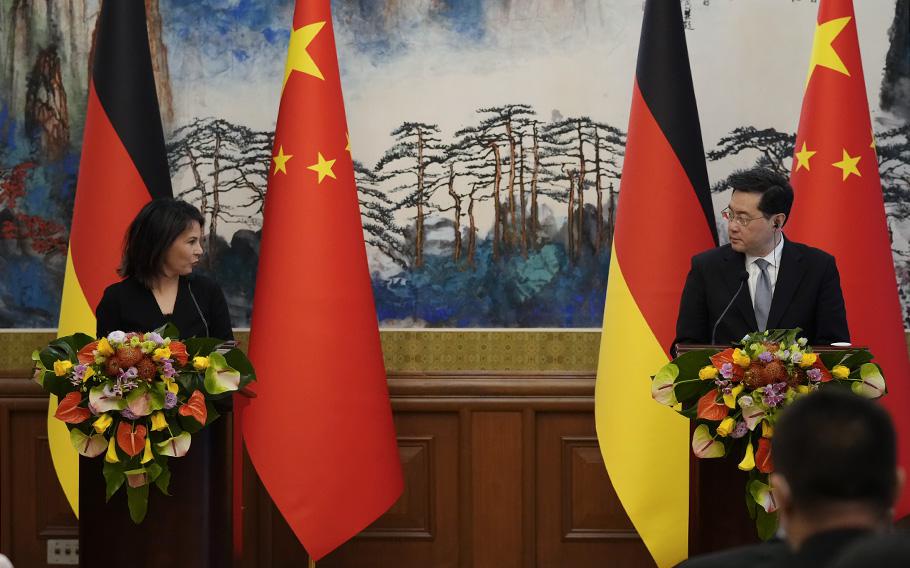
German Foreign Minister Annalena Baerbock, left, and Chinese Foreign Minister Qin Gang attend a briefing in Beijing on Friday, April 14, 2023. (Suo Takekuma, Pool/Kyodo News)
(Tribune News Service) — Taiwan's destabilization would be a "horror scenario," German Foreign Minister Annalena Baerbock said in a testy public exchange with her Chinese counterpart.
Speaking next to China's Qin Gang in Beijing on Friday, Baerbock said a change in Taiwan's status would be "unacceptable."
"We remain committed to our one China policy, but at the same moment we are concerned about the current situation in the strait of Taiwan," Baerbock told reporters at a press briefing in China's capital. She added that a "military escalation" in the strait "would be a horror scenario for the whole world."
Qin fired back at Baerbock during the briefing, saying that the world "needs to respect that Taiwan is part of China." Beijing has long claimed the democracy as part of its territory.
"There's only one China in the world, and Taiwan is an inseparable part of it," Qin said, in remarks that matched Baerbock's strong language on the issue. "The Chinese government and its people are defending the country's territorial integrity."
Baerbock's arrival in China came as she has worked with German Chancellor Olaf Scholz on the nation's China strategy. Berlin is expected to get tougher on Beijing as it has ramped up military drills around Taiwan in recent months.
On Friday, Qin defended China's actions, saying that the tensions in the Taiwan strait were "provoked by foreign forces."
Josep Borrell, the European Union's foreign policy chief, reiterated the bloc's position later on Friday, saying that "any attempt to change the status quo by force is unacceptable."
The People's Liberation Army held several military drills around Taiwan in recent days, marking some of the most notable exercises since former U.S. House Speaker Nancy Pelosi (D-Calif.) visited Taipei last year. This time around, the provocation appeared to come from Taiwan President Tsai Ing-wen's recent meeting on U.S. soil with the current House speaker, Kevin McCarthy (R-Calif).
Last week, Emmanuel Macron said that Europe shouldn't simply follow the US's hawkish stance on Taiwan, leading to widespread criticism and confusion over where Europe falls on the issue. The French president has since defended his position and has said his position on Taiwan hasn't changed.
The talks between Qin and Baerbock were also expected to address human rights in China and Beijing's role in the global fight against climate change.
Baerbock emphasized the importance of the Germany-China relationship, saying her country "does not want a decoupling" from China. But she also said that there is growing concern about the way in which China has risen to become a global power.
"Europe has achieved its own rise 150 years ago with expansionism, oppression and colonialism. Many people are therefore now listening carefully when China today announces its goal to become a world power until 2049," Baerbock said. "These people are asking themselves which path China will choose."
That point, too, appeared to irk Qin.
"In the past, Western colonization brought a lot of suffering to the world," Qin said, adding that China "will not use the old paths of Western colonialism, but will instead build a world in which humanity will find peace and security."
Qin acknowledged that there are "of course differences of opinion" between China and Germany, but said the exchange needed to be based on "mutual respect."
"What China doesn't need is a master teacher from the West," he said.
Bloomberg's Philip Glamann and Kevin Whitelaw contributed to this report.